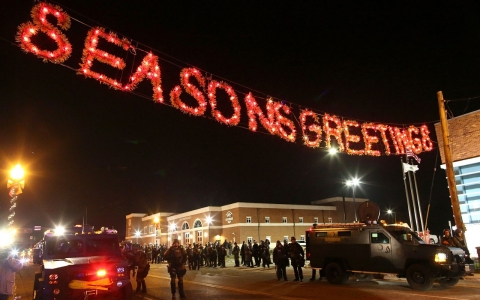FERGUSON, Mo. — Dante Williams has lived in Ferguson all his life. He’s a chef at Vincenzo’s Italian restaurant, next to the police station. On Tuesday morning he stood on a cold sidewalk near the restaurant with a shovel, helping clear debris from protests over a grand jury's decision Monday not to indict Officer Darren Wilson for the killing of unarmed black teenager Michael Brown.
Williams said he came out “just to clean up and make sure everything is safe,” adding that he doesn’t support the protests. “I don’t condone that,” he said. “I’m a nice person. I just want to keep everybody calm. I’m a peacemaker.”
But he was disappointed by the grand jury's decision not to charge Wilson with any crime in the Aug. 9 shooting death of Brown.
“I was kind of hurt,” he said, “but the thing is, you got to leave it in God’s hands.”
Behind him drills whirred, and saws buzzed. Dozens of residents, black and white, young and old, had arrived to help pick up the pieces. They wore heavy coats and stocking caps and wielded shovels, brooms and vacuums. Windows broken in the night were boarded up, and plywood was placed over those that survived, protecting them from any violence in the nights to come. A woman emerged from El Palenque, a nearby Mexican restaurant, with plates of tostadas and crunchy tacos, distributing them to the workers boarding up the Quiznos sandwich shop next door.
On Monday night, a little after 8 p.m. local time, St. Louis County Prosecuting Attorney Bob McCulloch announced the decision that most experts had predicted: Wilson would not be indicted. But even if it wasn’t a surprise, it came as a shock. Within minutes, the scene in Ferguson turned chaotic. Several buildings along this historic downtown strip were vandalized. Up the road, a Little Caesars pizzeria burned.
Across town on West Florissant Avenue, the center of protests for the past three months, several buildings and cars went up in flames. Tuesday morning, police had taped off that entire stretch, declaring a few blocks of businesses a crime zone and prohibiting all access. It was trash day, so people lugged bulging black bags to the curb, within feet of the line of police tape. At the Canfield Green Apartments, where Brown was killed, a woman added a poster to the ever-growing memorial, where crunchy brown leaves had settled in among the candles and stuffed animals.
At the Little Caesars, a couple of young men used brooms to push debris across the parking lot, until someone warned them to stay away from the “hazardous area.” At the nearby Ferguson Public Library, two men stood outside holding cardboard signs that said, “Certified teachers here for students.” With school canceled, volunteer teachers were welcoming kids, from preschool children to high-schoolers, to the library for tutoring and a meal. Similar programs were being offered at churches across town. One of the sign holders was Darius Rucker, who works for Teach for America. He was on the street Monday night.
“It was rough,” he said. “I got teary-eyed several times throughout the night. It is definitely a horrible, horrible injustice. The grand jury decision, the initial killing — it just doesn’t sit well with me still to this day. It won’t sit well with me until I feel that justice has been served.”
He said it’s unfair to blame all the protesters for the looting and arson when it’s only a small percentage committing crimes. Then he quoted Martin Luther King: “A riot is the language of the unheard.”
Near the police station, St. Louis County resident Bart Bouchein vacuumed up pieces of glass in front of Cathy’s Kitchen, a local diner. Tuesday morning, he saw on Twitter that people were coming together to clean up, so he drove right over. “It was very upsetting to watch on TV all of the destruction,” he said. “I was so moved by the photos of people helping.”
He said he was disappointed by what he saw on Monday night but thought the images presented by the media were only part of the picture. “The whole situation is tragic,” he said. “For every one looter, there’s a thousand people wanting to help. It’s fun to be out here this morning in a strange way, because there are a lot of people wanting to make things right.”
Ken Jenkins is a pastor whose brother and sister-in-law own Cathy’s Kitchen. He came out to clean up too, only to find that volunteers had beaten him to it. He was disheartened that police hadn’t done more to protect businesses, especially on West Florissant, where rubble was still smoldering as he spoke.
“It’s kind of heartbreaking to see the response,” he said. “Even more troubling, all the contingency plans that were made and not to see them really enact it. There was no National Guard. Nobody shows up.”
He said that despite everything, Ferguson is still a good place to live. “Just to see the community show up, that was a blessing,” he said. “It’s not the community that has been doing the damage to property. It’s a lot of outsiders. This is the community. What you see out here.”

Lawyers for family of slain teen say legal process ‘broken’ and ‘unfair’ after grand jury clears officer

After a grand jury decides not to indict a police officer in shooting death, Ferguson leaders call for political action

Local people respond to the grand jury decision not to indict a white officer for the killing of an unarmed black teen






Error
Sorry, your comment was not saved due to a technical problem. Please try again later or using a different browser.